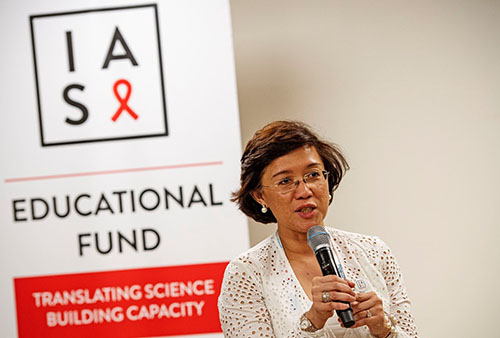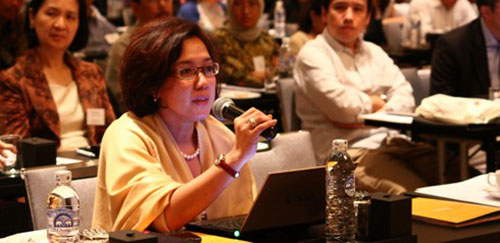International AIDS Society (IAS) President-Elect Dr. Adeeba Kamarulzaman, the first person from Asia to hold this position, is Dean of the Faculty of Medicine at the University of Malaya. Dr. Kamarulzaman established the Infectious Diseases Unit and the Centre of Excellence for Research in AIDS (CERiA) at the University of Malaya Medical Centre. She is chair of the Malaysian AIDS Foundation, Adjunct Professor at Tulane University in New Orleans, and Adjunct Associate Professor at Yale University. She was previously chair of the TREAT Asia steering committee and a founding site principal investigator for the TREAT Asia HIV Observational Database.

Dr. Adeeba Kamarulzaman
TREAT Asia Report: What do you expect will be the major themes emerging at the IAS Conference on HIV Science in Mexico City this July?
Dr. Adeeba: I think there'll be a lot of attention on PrEP, particularly its implementation. But what we're really excited about is the high number of abstract submissions from each of the tracks and especially track D, which is social, behavioral, and implementation science. There’s always a concern that basic scientists might shy away, especially when the conference is located far from many researchers. To my pleasant surprise, we've got good representation from Asia and the Pacific. And we’ve ended up with more women presenters and young scientists. So it seems like we're heralding a new generation of HIV researchers.
It seems like we're heralding a new generation of HIV researchers.TREAT Asia Report: What are the main focus areas of the International AIDS Society?
Dr. Adeeba: First, the science, of course. We're the world’s largest association of HIV professionals, with over 10,000 members from more than 180 countries, and our focus is always to advance and advocate the best science and evidence-based strategies to reduce the global impact of HIV. Through our 12 programs and campaigns, we work to support and cultivate a new generation of youth advocates and young investigators, advance gender transformation and inclusivity, and defend human rights and eliminate discrimination. We’re also the hosts of the International AIDS Conference and the IAS Conference on HIV Science, which both serve as global platforms to strengthen policies and programs that ensure an evidence-based response to the epidemic and translate science into practice.
TREAT Asia Report: The selection of San Francisco and Oakland, California, for the 2020 International AIDS Conference has been controversial because of opposition to some of the policies of the U.S. government. How do you explain to the IAS’s critics the benefits of holding the conference in the U.S.?
Dr. Adeeba: I can understand the sentiments. As a Muslim myself, the Muslim ban and similar policies announced early in the Administration were unacceptable. However, I would say that this is exactly the reason why we must go the U.S. Experience tells us that locations with significant challenges frequently offer the greatest opportunities for change. AIDS 2000 in Durban is a good example. We went in fully aware that the South African President was in denial that HIV even caused AIDS. That gathering served as a global platform for civil society and the broader HIV community worldwide with a message that inaction is inhuman. It was a turning point that unlocked treatment for the most affected country, which is now home to the largest HIV treatment program in the world.
Additionally, the U.S. government plays a vitally important role in addressing the epidemic both globally and domestically. Year after year, we see attempts to dismantle and defund these programs. Despite this, the U.S. still contributes three of every four donor dollars going towards global HIV and AIDS programs and, with the recent commitment by the U.S. President to end AIDS by 2030 in the U.S., we have an opportunity to leverage this commitment and ensure we have continued U.S. support that is necessary to end the epidemic. Returning to the Bay Area—a sanctuary of the HIV response—for the first time in 30 years is a major historic milestone. This is also the first time the conference will be hosted in two cities—which have jointly shown their willingness to leverage it as a platform to challenge discriminatory policies, in partnership with conference organizers. I for one, truly believe this will be a change-making conference that we desperately need for the HIV response at this moment.
.jpg)
Dr. Kamarulzaman (left) with Kevin Robert Frost (center), CEO of amfAR, and Dr. Annette Sohn (right), Director of TREAT Asia, at the University of Malaya Medical Center, Kuala Lumpur, in 2012.
TREAT Asia Report: Malaysia is the first country in the Western Pacific region to eliminate mother-to-child transmission, reflecting how far your national program has come in maternal-child HIV care, is that correct?
Dr. Adeeba: I think so. Initially we had a predominantly male epidemic because of injecting drug use. So we had a lot of lead time before it spilled over to women—who were mostly the sexual partners of male injecting drug users. So relatively speaking we had fewer affected women at first. On top of that, the Malaysian Ministry of Health took a proactive stance in introducing antenatal screening at a very early stage in the late 1990s, and it also instituted the prevention of mother-to-child transmission protocol. Those efforts have obviously paid off.
TREAT Asia Report: Are these lessons that could be applied to other countries in the region?
Dr. Adeeba: In Malaysia we are also proud that more than 90% of our funding for treatment and prevention is domestic. We are a middle-, or upper-middle-income country, and have a relatively smaller epidemic than many other countries around us. But we’ve still had that commitment to address it. And we also have a pretty good health infrastructure. I think all the necessary factors came together: the political will, the financing, and the infrastructure. But it's not all rosy. We, like many other countries in the region, are seeing a rise in the epidemic among men who have sex with men in the last few years, driven partly by the amphetamine epidemic. So we’ve still got a lot of work to do. And, of course, stigma and discrimination still drive people underground and form a barrier to testing and treatment.
 Liza Minelli (left) with Dr. Kamarulzaman (center) and Kevin Robert Frost (right), speaking on behalf of amfAR’s TREAT Asia program at the 2005 Life Ball in Vienna, Austria.
Liza Minelli (left) with Dr. Kamarulzaman (center) and Kevin Robert Frost (right), speaking on behalf of amfAR’s TREAT Asia program at the 2005 Life Ball in Vienna, Austria.
TREAT Asia Report: Is the stigma directed primarily at the LGBT community, or drug users, or both?
Dr. Adeeba: In Malaysia, it's definitely much stronger towards LGBT people. To some extent, harm reduction lessened the stigma towards people who use drugs, although it’s definitely still there. But stigma towards LGBT people and sex workers is very deep and ingrained.
TREAT Asia Report: In your travels, have you seen any bright areas where people are having some success at combatting stigma?
Dr. Adeeba: One thing I think we're going to have to use is self-testing and support through technology, to bypass the usual mechanisms of service delivery. Stigma is worse among healthcare workers in terms of its pervasiveness and how it impacts patients. At the University of Malaya we're keen to ensure that interventions on stigma are not just ad hoc but included within the medical curriculum so everybody gets taught about it. One intervention that has been proven to work is for students to have exposure to affected people and groups. So we have sessions with people from the LGBT community, people who use drugs, and people living with HIV. Some of the students have led very sheltered and isolated lives, and before this haven’t met anyone who's not like them.
TREAT Asia Report: Is religious conservatism still a major problem?
Dr. Adeeba: I think it is still a problem, not just in Malaysia, but around the world. And unfortunately, the respect for human life and dignity and compassion that's very much part of Islam gets drowned out by the negativity towards LGBT people. It’s a problem not just in Islam, but in other religions, too. Health professionals in particular need to separate those negative attitudes from our obligations, and not be judgmental. It's very difficult to get people to understand and accept that.

Dr. Kamarulzaman at the TREAT Asia Network Annual Meeting in Kota Kinabalu, Malaysia, 2012
TREAT Asia Report: There has been some concern that the Asia-Pacific is falling behind parts of sub-Saharan Africa in its AIDS response. Are there broad strategies that need to be implemented or improved upon to expand access to treatment and prevention and to make progress towards the 90-90-90 targets that UNAIDS has set for 2020? (The “90-90-90” targets call for 90% of all people living with HIV to know their status, 90% of all diagnosed individuals to be on treatment, and 90% of those on treatment to be virally suppressed.)
Because of stigma, you're not even getting people to the first 90, due to their fear of coming forward.Dr. Adeeba: I think there are two major reasons that Asia is lagging. One is that the epidemic is concentrated among key populations in most countries. Because of stigma, you're not even getting people to the first 90, due to their fear of coming forward. The second contributing factor is the income bracket that many of our countries fall into: middle- or upper-middle-income. Most of us are not in PEPFAR-supported countries where there's a concerted effort to provide funding for treatment and prevention scale-up. So I think those two things have collided to leave us behind. I definitely feel it in Malaysia. We're grateful for the little bit of funding that the Global Fund has provided. But it’s not as much as we need. On the whole, international funding has been decreasing.
TREAT Asia Report: When you were interviewed by the TREAT Asia Report in 2006, you described some of TREAT Asia’s work. How would you characterize the evolution of TREAT Asia and its impact since then?
Dr. Adeeba: It's still going very strong, and we have more sites now. One of the aims of the late Professor David Cooper in creating TREAT Asia with amfAR’s Kevin Frost was to develop a whole cadre of scientists and researchers in Asia and the Pacific. Most sites are seeing newer, younger people coming on board. In terms of the actual science, it's always very busy with people putting in ideas and abstracts and manuscripts, and analyzing the treatment sphere in Asia. I wish we could do more original clinical trials. But of course, running a randomized controlled trial in multiple sites swallows millions of dollars.
TREAT Asia Report: What are your hopes and aspirations for the next five years?
Dr. Adeeba: I hope that with me coming on board as the first Asian president-elect of IAS we could shift the spotlight onto Asia a little bit and to all those issues that we just talked about. And hopefully I could lend my voice at a global level to treatment and support for people who use drugs—people who are very, very behind—not just in Asia, but all around the world.